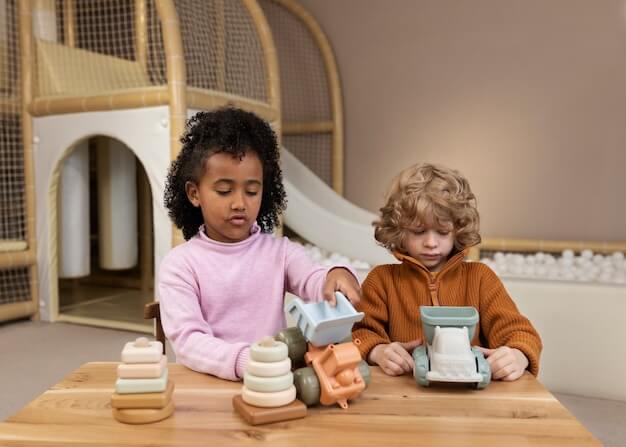A few days ago, I saw a news that two children were robbing toys at the playground, which led to a big fight between adults of the two families, and even some people were injured. It was really shocked.
Parents have similar experiences. Many of the conflicts between children come from fighting for goods.
In public places, strangers rob each other, in kindergartens, classmates rob each other, and even at home, brothers and sisters rob each other equally!
In order to properly handle the problem of children competing for goods, you may first need to understand how the child thinks, who he thinks it belongs to and who should play with it. Because, in this respect, children and adults have very different ideas.
Today, let's talk about the child's understanding of the ownership of goods, such as how he knows what belongs to others and what belongs to himself.

Part one
Children of two or three years old will especially safeguard the ownership of the goods they have worked for.
For example, the child has a dough, and he made a doll out of it. If someone took the doll away, they would protest very strongly. But if someone takes away the plasticine, the child's reaction is usually not so fierce.
When my sister destroys her painting, will she be particularly angry? Do you have a better understanding of why your child reacts so violently when you throw away his "junk"?
Part two
Researchers have done such experiments. They show children that two people play a toy one after another. The first person plays for a short time and the second person plays for a long time. Then they ask the child, whose toy is it?
Children tend to think that toys belong to the first person, even two-year-old children are no exception.
Interestingly, they are very persistent about "first come, first served". When an item is given to others as a gift, 3-year-old children still tend to think it belongs to the original person.
The researcher told a story to a child who was two years old and three years old. He said that the garden had given him a doll for his birthday. Then who owns the doll now? Most of the children said it was still clear. It was not until the age of four that the child realized that what he gave to others was others'.
You may want to say that since children understand first-come, first-served when they are two years old, why do children often compete in public places?
One possible reason is that he cannot control himself. Children are easily attracted by the appearance or function of objects and give up the principle of ownership.
For example, when the child saw an electric duckling, he thought to himself, "That duckling can still bark. It's too funny. I want to play!" He could not control his impulse and left the ownership behind. So some researchers speculate that children with strong executive control ability are less likely to compete for goods.

Part three
You must have experienced a similar situation: a child plays with a ball. After a while, he stops playing with the ball and goes to play with building blocks. At this time, another child comes to play with the ball. The first child is unwilling to play and runs to grab it. He doesn't play for himself or for others.
Our adults must say, "Why are you so selfish?" Actually, he is not defending his own ownership.
Adults may consider the needs of users. But the child firmly believes that the owner of the goods has the right to use and determine the distribution, and his things must be his the final say.
How to avoid children competing?
Please do your homework in advance!
After understanding children's views on ownership and use rights, let's talk about how to avoid children competing for goods.
I think the most important three points are: first, respect and cultivate children's sense of ownership; Second, teach children to understand others' feelings; Third, teach children to put forward their own needs.
one
Respect and cultivate children's sense of ownership
When the child is about two years old, he becomes aware of the ownership of the goods. At this time, the child is very clear about the rights of the owner: this thing is mine, and I don't allow anyone to move it. He is practicing his autonomy and has a sense of control.
As parents, we need to understand the exclusive persistence of children, respect their authority over their own distribution of goods, and never force children to share.
In fact, when a child has a strong sense of ownership, he can clearly know that "this thing belongs to me", and is more likely to distribute his own things to others.
When you talk to children, you can use "my" and "yours" to help them strengthen the concept of ownership. For example, say to him, "My mother bought a car and a dress. This car is yours. The dress is my sister's."

two
Teach children to understand others' feelings
How can children also consider the needs of others? We can usually encourage children to learn to think in different places and think about others' feelings.
On the one hand, when the child receives the courtesy of others to share, or is rejected by others, help the child taste his mood at that time.
For example, "My little sister asked you to slide first. How do you feel? You smiled, very happy, didn't you?"
"You want to play on the swing. You have been waiting for a long time, but the little friend still won't play for you. You are very frustrated and even a little angry now, aren't you?"
On the other hand, it can guide children to perceive others' emotions.
For example, "He wants to play with your toys. If he doesn't give them, what is his mood?" If the child realizes, "If he doesn't give them, he will lose."
You can continue to guide: "What should I do?" What needs to be noted here is that you should not make decisions for the child, and let the child decide for himself.
Even if the child decides: "Let him lose, this toy is mine." Don't blame the child for selfishness.
As long as the child begins to experience the feelings of others, even if the child does not share this time, then the child will be more generous.
three
Teach children to put forward their own needs
Finally, it is very important to teach children to put forward needs. When he wants something, how to ask others.
For example, the most basic principles should be spoken in language, not directly taken; Also, if you have a friendly attitude, you may have a greater chance of success; In addition, you can legitimately claim your rights.
In this process, you should give more guidance to your child. If the child is young, you can demonstrate it yourself.
For example, in the amusement park, the child wants to play on the swing, but there is already a child playing on the swing. You can say to the child: "That child came first, so he played first, let's play the others first, and then come back later." Then you can say to the child on the swing: "Hello, little friend, we also want to play on the swing, you play first, let's play later, OK?"
Regardless of whether the child's needs are met or not, you can take the opportunity to chat with the child about his feelings, and the feeling is very good; I'm not happy to be rejected. I need to appease you.
It can also be explained that sometimes you can get it by asking, sometimes you need to wait patiently for a while, and sometimes you will be rejected directly. These are all possible to help children realize that things in the world are not black or white.
When two children quarrel, they often shout "This is not fair". They quarrel with you for a long time and I play for a short time. They quarrel with you more than I do.
Adults often laugh secretly in their hearts. Little fart, you know what is fair! I tell you, children really know how to do things fairly. Don't underestimate them.
If you don't believe it, you can do an experiment with your child when you go back: take ten sweets and let the child divide them into two parts, one for him to keep and one for you. Then take another ten candies and tell the child to divide them into two parts, but you have to pick out one and give him the rest.
You can see which of the two distribution results is more average.
The researcher's experimental results found that even three-year-old children will get more average scores in the second time. They know what is fair and will make some small efforts for their own interests.
If your child gives you more sugar the first time, it means he really loves you


